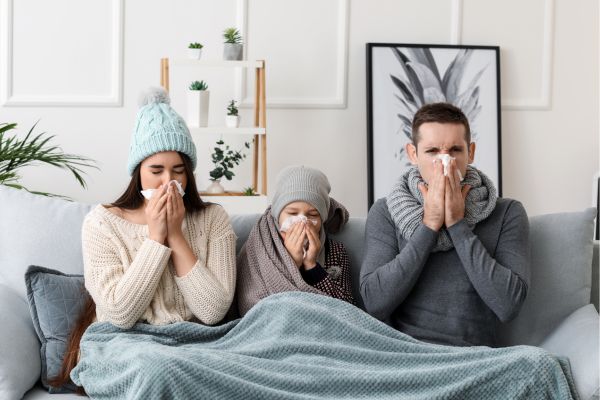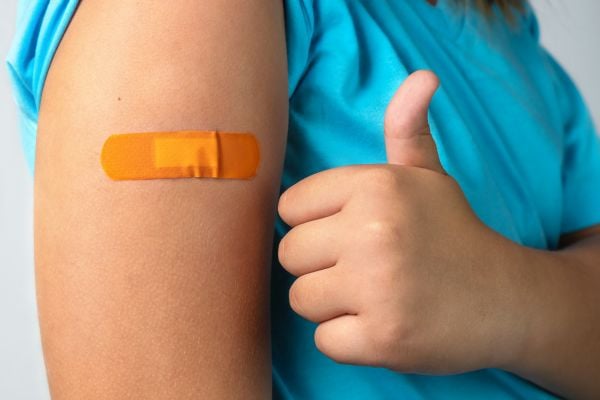 Winter: A time of sweaters, hot drinks, comfort food, snow sports, and … runny noses and sore throats. With a few simple habits, you can stay ahead of germs and spend more time on the sweaters, hot drinks, and other great things that come with winter and less time on dealing with illness.
Winter: A time of sweaters, hot drinks, comfort food, snow sports, and … runny noses and sore throats. With a few simple habits, you can stay ahead of germs and spend more time on the sweaters, hot drinks, and other great things that come with winter and less time on dealing with illness.
Practice Good Hygiene
The primary way to prevent illness and reduce the spread in our communities is to follow good personal hygiene habits:
- Wash your hands: Regularly washing your hands and doing so thoroughly is one of the most important steps you can take to stay healthy. Wash after using the bathroom; before preparing or eating food; after blowing your nose, coughing, or sneezing; after feeding or petting your pets; and after visiting or caring for a sick person. Make sure you wash for at least 20 seconds, lathering and scrubbing hands thoroughly.
- Cover a cough: Whenever possible, cover your mouth and nose with a tissue when you sneeze or cough, then dispose of it. If you don’t have a tissue handy, sneeze into your elbow, not into your hands.
- Avoid touching your eyes, nose, and mouth: These are easy places for germs to enter your system.
- Wash and bandage all cuts: Clean cuts to remove any debris and bandage them to create a protective barrier against bacteria and other contaminants.
- Don’t share dishes, glasses, or eating utensils: Sharing these items may also mean sharing germs that can make you sick.
Avoid Contact with Sick Individuals
Stay away from people who are sick or have symptoms of an infection. Likewise, stay home when you are sick to help avoid spreading your illness to those around you.
Vaccinations
 Vaccines may not eliminate the chances of you getting sick with the flu, COVID, or other diseases, but research shows vaccines:
Vaccines may not eliminate the chances of you getting sick with the flu, COVID, or other diseases, but research shows vaccines:
- Reduce the risk of illness and the need to see a doctor if you contract an illness or disease
- Decrease the severity of illness
- Lower risk of hospitalization
- Prevent life-threatening complications
In addition to these benefits for you, getting vaccinated can help create community immunity and protects high-risk individuals around you. Consult with your healthcare provider regarding your immunization status and for any questions you have regarding vaccines.
Clean and Disinfect Surfaces
Regularly cleaning surfaces in your home helps prevent the spread of germs that can make you sick. High-touch surfaces, such as light switches, doorknobs, and countertops, should be cleaned often. Other surfaces should be cleaned when they are visibly dirty or as needed.
While cleaning alone can remove most harmful viruses or bacteria, there are times when you will need to disinfect surfaces, including when someone in your home is sick or you have someone with a weakened immune system. Clean the surfaces first, then disinfect. Carefully follow instructions on any disinfectant, wear protective equipment, and ensure there is good ventilation in the area you are disinfecting.
Maintain a Healthy Lifestyle
 Healthy lifestyle choices, like regular exercise and a nutritious diet, can help build up your immune system and protect you from illness.
Healthy lifestyle choices, like regular exercise and a nutritious diet, can help build up your immune system and protect you from illness.
- Eat a balanced diet rich in fruits, vegetables, and whole grains.
- Exercise regularly: Aim for 150 minutes of moderately intense activity, such as brisk walking, per week.
- Get enough sleep: Adults should get at least 7-8 hours of sleep each night, while children should get more, depending on how old they are.
- Manage stress: According to research, the stress hormone cortisol can turn off or shut down cells in the immune system and increase your risk of getting sick.
- Stop smoking or vaping: Not only will this make you less prone to illness, but it will reduce your risk of complications, particularly with COVID.